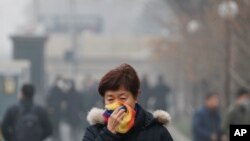This year the annual awareness month, observed each November, is calling attention on the education, empowerment, and eradication of the disease, aiming to raise awareness of lung cancer signs and the benefits of early diagnosis to access medical care.
According to the WHO, smoking is the leading cause of lung cancer, responsible for approximately 85% of all cases. The disease can also affect non-smokers.
The health agency says at least 1.8 million people die of lung cancer globally. More than 2.2 million new cases of lung cancer were reported in 2020.
Oncologist Dr. Catherine Nyongesa says lung cancer is frequently diagnosed at an advanced stage reducing treatment options and survival rates.
"Lung cancer often remains asymptomatic in the early stages making it extremely difficult to detect," Nyongesa told VOA.
She says part of the challenge in diagnosing lung cancer is the screening, which is not as advanced as other cancers, adding lung cancer in many patients is at times misdiagnosed for pneumonia, TB, or other conditions like chronic asthma.
"There are also nonspecific symptoms. When symptoms do appear, they can be similar to other respiratory conditions, leading to a delayed diagnosis. Interpreting chest imaging like CT scans can be challenging, and false positives and negatives are common," she said.
Lung cancer risk factors include exposure to secondhand smoke, occupational hazards, air pollution, hereditary cancer syndromes, and previous chronic lung diseases.
In Africa, industrial exposure to chrome, coal, copper, gold, nickel, arsenic, and silica are also associated with lungs cancer.
The WHO has implemented several initiatives to address lung cancer, including calling for early detection programs and encouraging countries to implement screening measures for high-risk populations to detect lung cancer at earlier stages when treatment options are more effective.
It says primary prevention — such as tobacco control measures and reducing exposure to environmental risk factors, including breathing unhealthy air — can reduce the incidence of lung cancer and save lives.















Forum